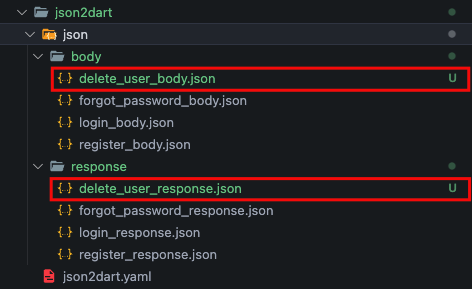Json2Dart
This command is used to generate the API based on the configuration json file in the json2dart/json2dart.yaml file
morpheme json2dart
The generated API will be available according to the features and pages that we configure.
To add API we have to add this following line:
feature_name:
page_name:
api_name:
base_url: base_url
path: endpoint_name
method: your_api_method
body: url_file_body_json
response: url_file_response_json
header: url_file_hearder_json // optional
cache_stategy: cache_stategy // optional
Cache Strategy :
Inside json2dart.yaml there are cache_strategy allow additions: async_or_cache, cache_or_async, just_async, just_cache. by default set to just_async.
async_or_cache: strategy to fetch the api first and cache the response. if fetch fails it will return data from cache.cache_or_async: strategy if there is data in the cache and it is not expired then it will return data from the cache first. otherwise it will fetch api and responsen will be cached.just_async: a strategy that only fetches the api to get the data.just_cache: a strategy that only gets data from cache.
cache_strategy: async_or_cache
cache_strategy:
strategy: async_or_cache
ttl: 60 #in Minutes
keep_expired_cache: true
Extra notes:
We can add more than one api on a page.
Allowed methods: get, post, put, patch, delete & multipart.
Options : (We need to add this manually)
json2dart/json2dart.yaml...
json2dart:
body_format_date_time: yyyy-MM-dd // default is .toIso8601String()
response_format_date_time: yyyy-MM-dd HH:mm // default is .toIso8601String()
api: true // default is true
endpoint: true // default is true
unit-test: false // default is false
replace: false // default is false
...
For example, we will add the delete user API to page users in the master feature using json2dart, here are the steps:
Add json files for "response" and "body" API, response json files in
json2dart/json/response/, for body json filesjson2dart/json/body/ json2dart/json/body/delete_user_body.json
json2dart/json/body/delete_user_body.json{
"id_user":"id_user"
}json2dart/json/response/delete_user_response.json{}Add the delete_user API configuration to the
json2dart/json2dart.yamlfilejson2dart/json2dart.yamljson2dart:
body_format_date_time: yyyy-MM-dd
response_format_date_time: yyyy-MM-dd HH:mm
api: true
endpoint: true
unit-test: false
replace: false
environment_url:
- &base_url BASE_URL
remote:
.login: &login
base_url: *base_url
path: /login
method: post
# header: json2dart/json/header/login_header.json
body: json2dart/json/body/login_body.json
response: json2dart/json/response/login_response.json
cache_strategy: async_or_cache
.register: ®ister
base_url: *base_url
path: /register
method: post
# header: json2dart/json/header/register_header.json
body: json2dart/json/body/register_body.json
response: json2dart/json/response/register_response.json
cache_strategy:
strategy: cache_or_async
ttl: 60
.forgot_password: &forgot_password
base_url: *base_url
path: /forgot_password
method: get
# header: json2dart/json/header/forgot_password_header.json
body: json2dart/json/body/forgot_password_body.json
response: json2dart/json/response/forgot_password_response.json
cache_strategy:
strategy: just_cache
ttl: 120
keep_expired_cache: true
# Add delete user
delete_user: # api-name
base_url: *base_url
path: /delete_user
method: delete
body: json2dart/json/body/delete_user_body.json
response: json2dart/json/response/delete_user_response.json
cache_strategy: just_async
auth:
login:
login: *login
register:
register: *register
forgot_password:
forgot_password: *forgot_password
# Add delete user
master:
users:
delete_user: *delete_userGenerate API with this command
morpheme json2dartThe delete user API is automatically added to page users in the feature master, after that we need to add the BLoC to our Cubit.